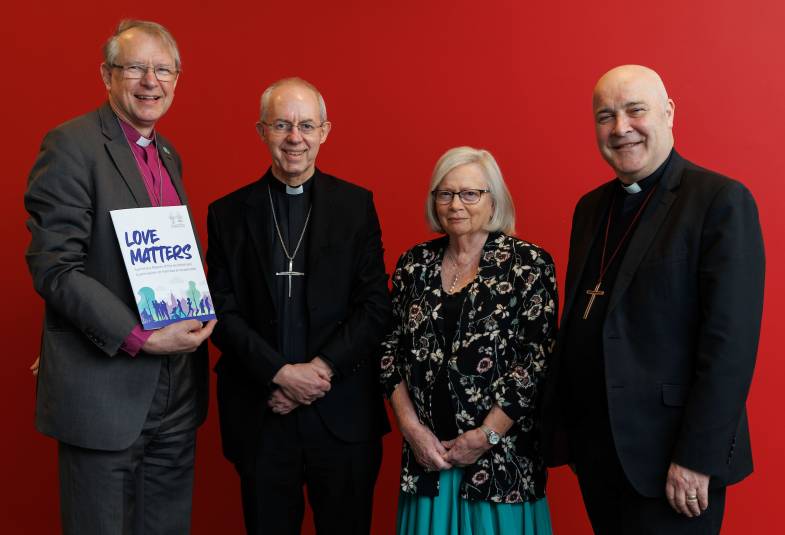
In a report published today (“Love Matters”), the Archbishops’ Commission on Families & Households makes a series of recommendations about how families and households can best flourish and calls on institutions – from the Church of England to Government – to put ‘family’ at the centre of their thinking; and individuals – whether married, single, or in a couple – to commit to relationships of all kinds that lead to the flourishing of one another.
‘Love Matters’ says that the quality of family relationships matters more than the form a family takes. It argues that although for many the concept of family has evolved, the essential values underpinning flourishing family life remain the same.
Drawing on a rich body of primary data collected through an extensive Call for Evidence, visits to communities up and down the country, events, round table discussions and surveys, meetings with interfaith leaders, listening and learning from children and young people, hearing from parents and teachers, as well as contemporary literature, the Commission outlines five ambitions to support and strengthen family life.
We must:
- Value families in all their diversity, meeting their basic needs by putting their wellbeing at the heart of Government policy-making and our community life, including religious communities.
- Support relationships throughout life, ensuring that everyone is able to develop and maintain loving and caring relationships, manage conflict well and promote the flourishing of individuals and families.
- Honour singleness and single person households, recognising that loving relationships matter to everyone.
- Empower children and young people, developing their relational skills and knowledge, recognising their value and agency, and protecting them from harm and giving them the best start in life.
- Build a kinder, fairer, more forgiving society, removing discrimination, division and deep inequality for the sake of every family and household.
Established in March 2021 by the Archbishops of Canterbury and York, the Families & Households Commission was asked to explore what families and households of all shapes and sizes need in order to flourish. The report lays out a number of recommendations to the Church of England and the Government about how this can be achieved.
Welcoming the report, the Archbishop of Canterbury, the Most Revd Justin Welby said: “With wisdom and timeliness, ‘Love Matters’ encourages us to prioritise the hopes, needs and aspirations of families – in all their diversity. We must do so as institutions and as individuals. As followers of Jesus Christ, we are called to share the overflowing love of God, who calls us into relationship with Himself and one another. As this report demonstrates, there is much to celebrate but there is a great deal still to do if we are to ensure the flourishing of every family and household.”
The Archbishop of York, the Most Revd Stephen Cottrell, said: “This report reminds us of a simple yet profound truth: love matters. Each of us is encouraged to commit to loving relationships of all kinds that build up one another. This starts with us as individuals, in our local areas and within our worshipping communities, to support and strengthen family life so that we all flourish together. I pray that this rich resource changes how we live together in our shared family and community life.”
Commenting on the release of the report, the Chair of the Commission, Professor Janet Walker OBE, said: “‘Love Matters’ tells a story of opportunity, hope and love. It reimagines a kind, fair and forgiving society which values and accepts everyone for who they are, provides the loving care that children and young people need to thrive, and rejects discrimination and inequality. The report celebrates our multi-cultural society and the shared values across different faiths. It demonstrates the force for good when faith communities work together in partnership with local and national agencies and government, fostering communities in which individuals and families are supported and cared for, based on kindness and love.”
The Co-Chair of the Commission, the Rt Revd Paul Butler, Bishop of Durham, reflected: “Family lies at the heart of society. It is the context in which children are raised, love is shared and older generations are supported. But the reality of what ‘family’ looks like varies enormously across our society. What our report reveals is that the shape of family changes through our lives. It further shows that there is no one best shape, except that loving long term relationships are absolutely key for us all to flourish. Families matter. Relationships matter. Love matters.”
Notes to Editors
The origin of the Families & Households Commission lies in Archbishop Justin’s 2018 book ‘Reimagining Britain: Foundations for Hope’. Building on a key chapter, ‘Family - Caring for the Core’, the Commission’s aims were to articulate and address the pressures and challenges facing families and households, whilst also highlighting what works well and how that can be built on, drawing on Christian tradition.
The Commission sought to gather examples of good practice and in its recommendations proposes areas of action to support the work of the Church with families and households in new ways, and to offer proposals to shape the trajectory of public policy relating to families and households in a holistic way.
There were 12 Commission Members, whose details can be found here.
The final report will be available on Wednesday 26 April.